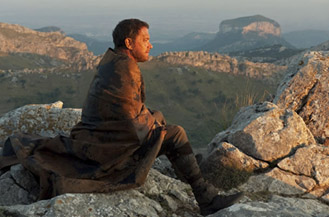Movie Review: Cloud Atlas
By Matthew Huntley
November 1, 2012
Most viewers will probably walk away from Cloud Atlas so perplexed and stupefied, they’ll think they need to see it again just to know what it’s about. That was my initial reaction, but after giving myself time to digest it, I realized it wasn’t that the film was difficult to comprehend, but that it was difficult for me to want to comprehend it. Technically and stylistically, this is one of the most daring and bold movies in recent memory; unfortunately, it’s not able to match that with substance. A lot of people will disagree with me on this, but I didn’t leave Cloud Atlas caring much about its themes or people. Luckily the film has other virtues to fall back on.
Given the scope of what happens in it, it would seem overwhelming and futile to try and sum up Cloud Atlas in a single review, so allow me to provide you with just the broad strokes of its various plots. It’s based on the novel by David Mitchell and opens in the distant future as an old man with a birthmark resembling a shooting star and a scar on the left side of his face begins to tell a story, which eventually breaks off into another story, and then another, and another, until finally, there are six stories in all. These do not exist in the same time or space, and therefore do not run in parallel, but they are connected by their themes, characters and, to the audience, recognizable actors.
The first takes place in 1849 in the Pacific Islands, where an American notary named Adam Ewing (Jim Sturgess) represents his father-in-law (Hugo Weaving) by overseeing a contract between him and a slave owner (Hugh Grant). While on the island, Adam witnesses the caning of a slave named Autua (David Gyasi) and is driven by his conscience to help him on his journey home. All the while, Adam is unknowingly poisoned by a devious doctor (Tom Hanks) who’s after his treasure chest full of gold.
Nearly a hundred years later, in early 1930s Europe, we meet a poor yet brilliant English musician named Robert Frobisher (Ben Whishaw), who begins working as an amanuensis to a Belgian composer (Jim Broadbent). The composer, Vyvyan Ayrs, is considered a master, but Frobisher adds his own flavor to Ayrs’ latest work, the sound of which reverberates and plays a significant role throughout the interconnected narratives.
Frobisher’s story is relayed through letters to his lover, another man named Rufux Sixsmith (James D’Arcy), who in 1975 is a nuclear physicist living in San Francisco. Sixsmith meets a journalist named Luisa Rey (Halle Berry) in an elevator and steers her toward a conspiracy involving a power plant.
In 2012, Rey’s mystery finds its way to the desk of a British publisher named Timothy Cavendish (Broadbent), who’s just represented a ruthless gangster and novelist named Dermot Hoggins (Hanks). After Hoggins throws a literary critic off a London skyscraper, his book flies off the shelves and Hoggins’ brothers and cohorts go after Cavendish for their share of the profits. Cavendish flees to Scotland and is inadvertently locked up in a retirement home against his will and kept under the watchful eye of a tyrannical nurse (Weaving).
Continued:
1
2
|
|
|
|




